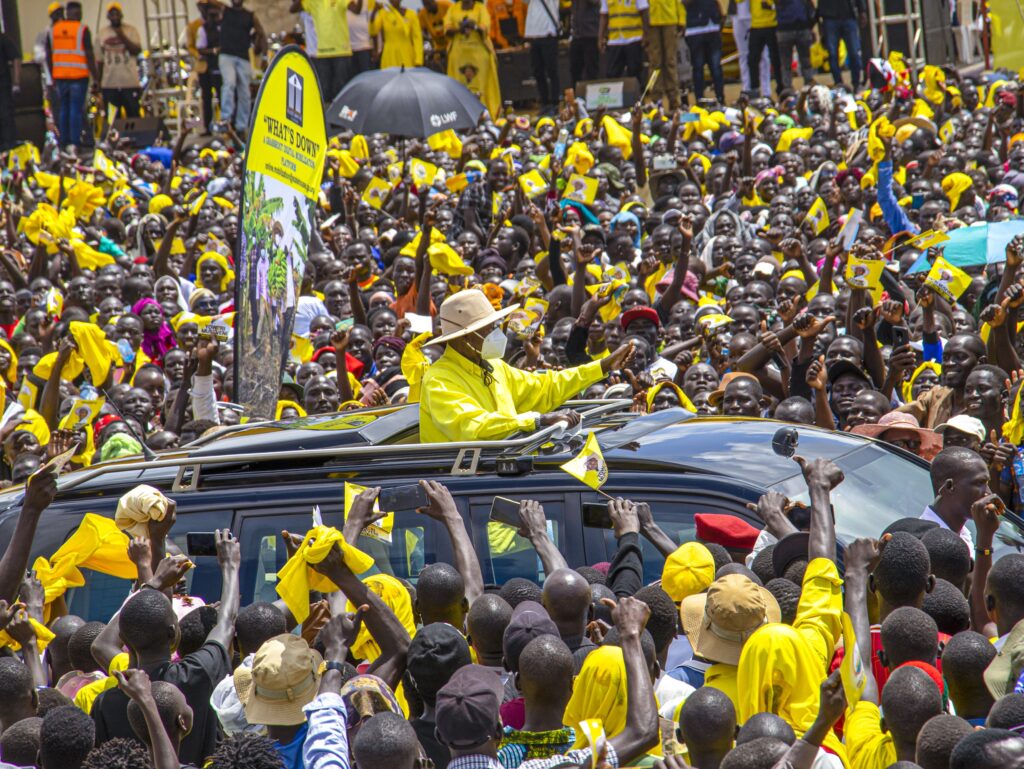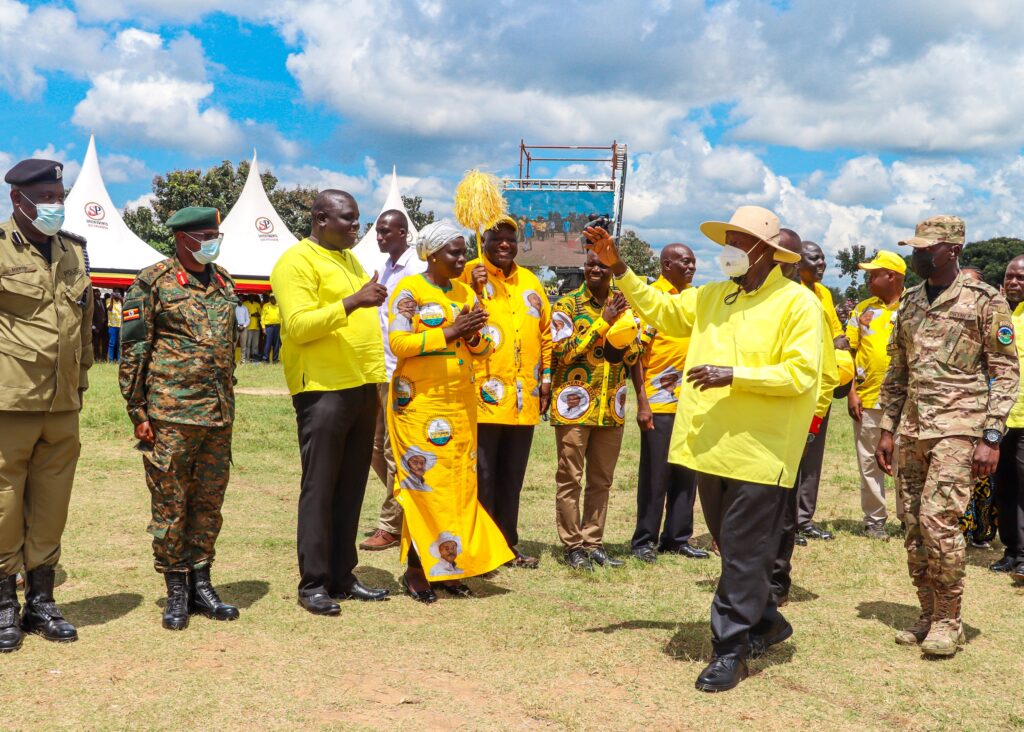
KAMPALA.President Museveni has reaffirmed his government’s commitment to improving the welfare of public servants, including teachers, but emphasized that Uganda must first consolidate its development foundations before increasing salaries.
Speaking at a mega campaign rally held at Paridi Stadium in Adjumani Town Council on Monday, October 20, 2025, the President, also the National Resistance Movement (NRM) Presidential flagbearer for the 2026 elections, concluded his West Nile sub-region campaign trail with a call for patience and focus on national priorities that sustain peace and shared growth.
“We are not against the salaries of public servants, but first of all, peace, the roads, electricity, health, and schools—then we can add on other things,” he said.
H.E. Museveni said that while calls for salary increments, especially from striking teachers, were understandable, national transformation could not be achieved through short-term demands.
“You have been hearing the teachers striking, saying that they want more salary. But is it correct to pay public servants more money when the roads are not done? Is it fair?” he asked, drawing loud applause from supporters.
The Adjumani rally marked the climax of President Museveni’s tour across the West Nile sub-region, where he traversed multiple districts to promote the NRM’s core campaign themes: peace, development, and wealth creation.
Flanked by top NRM officials, the President used the rally to explain why government spending priorities have remained anchored in national infrastructure and social services, drawing from his own experience in the Uganda People’s Defence Forces (UPDF), whose officers, he said, endured years of low pay for the sake of national peace.
“We in the UPDF have been fighting for no pay or low pay for the last 55 years because we could not demand a high salary from our mother, Uganda, when we knew that our mother did not have enough money,” H.E. Museveni said.
“What sort of a child are you when you come to a mother demanding more money, well knowing she does not have enough? The money of Uganda is public; it is in the budget. So, we must agree that roads must be tarmacked, and the murram roads must be maintained because the road affects the public servant and everyone else,” he stressed, while pointing out specific road projects in poor condition, inclu

ding the Pakele–Pabo road and the Adjumani–Obongi route, pledging government intervention.
“The security road from Pakele to Pabo is in bad condition and must be worked on. The road from Adjumani to Obongi is also in bad condition but we have finished the road from Gulu to Atiak to Adjumani, and we are continuing,” the President said.
He reminded supporters that before the NRM government came to power, the tarmac road network ended at Gulu, but has since been extended northwards to Atiak, Adjumani, Laropi, Moyo, Yumbe, and Koboko, opening up trade and security access to border areas.
“Once we agree on the budgeting—what comes first—things will move,” he said. “If there’s extra, then we can do other things. But let’s do the minimum first: the roads, the electricity, the schools, and the hospitals.”
Turning to the question of peace and national unity, the President described Uganda’s current stability as “a historic achievement unmatched in over a century.”
“It’s the first time in 100 years that the whole of Uganda is peaceful. Some people talk as if Uganda did not exist until the British came, but these tribes were here thousands of years before them,” President Museveni said.
He offered a brief history lesson, tracing Uganda’s long journey to peace and post-independence turmoil.
“We had peace between 900 and 1400 AD under the Bacwezi dynasty. After that, there was chaos, wars among successor kingdoms like Buganda, Bunyoro, Ankole, and others until the British came. After independence, there were more wars: Muteesa and Obote in 1966, Idi Amin from 1971 to 1979, and the NRM–UPC war between 1981 and 1986,” he recounted.
“Even after NRM took power, there were wars like those of Kony and ADF but because of our ideology of patriotism and Pan-Africanism, we defeated all of them.”
President Museveni said NRM’s inclusive ideology of opposing the wrong and supporting the right, not tribes or religions, had united Uganda and built strong national institutions, from the army to the judiciary and police.
“That’s why we can win elections nationally in the first round,” he said, adding that no single tribe or region could ever do that alone.
Regarding development, President Museveni told the Adjumani crowd that Uganda’s growing population was itself evidence of social progress.
“In 1969 and 1970, the whole of Madi, which includes Moyo, Adjumani, and Obongi, had only 90,000 people,” he said. “Now, Adjumani alone has 300,000. Why? Because of immunization. Children no longer die from preventable diseases.”
He cited healthcare and education as two pillars of NRM’s social development agenda, while acknowledging persistent challenges such as drug theft in government facilities.
“The one problem in health is the stealing of drugs. Our people are using computers, but I am also thinking of getting religiously inclined people to monitor for me this stealing of drugs in the 1,400 health centers,” President Museveni said.
No child should leave school because of money:
President Museveni reaffirmed his commitment to free education, saying that every sub-county without a secondary school and every parish without a primary school would be catered for in the next term.
“Since 1996, I have been telling you about free education, but some people don’t listen and continue to charge money in schools. That’s why children drop out,” he said, highlighting his Presidential Skilling Hubs, designed to train school dropouts with practical skills. One such centre, the Olia Hub in Adjumani, which serves the Madi Zone.
“I have already sent 50 million shillings to their SACCO per district for those who finished the six-month training,” President Museveni said.
He also proposed new initiatives for unemployed university graduates, saying the government would create a fund to support them if they remain jobless for more than two years.
President Museveni revisited his long-standing distinction between development-public goods such as roads and schools, and wealth, which is private and family-based.
He urged Ugandans to embrace household income programs like the Parish Development Model (PDM), which he called the culmination of earlier poverty alleviation efforts including Entandikwa, NAADS, Operation Wealth Creation, Emyooga, and the Youth Livelihood Fund.
“Each year, we shall bring 100 million shillings per parish. In five years, that’s 500 million. If you borrow one million and pay back with a small interest, that money will stay in your parish and grow. It will never go back to the government,” he said.
He also proposed new leadership and faith-based support funds.
“I’m proposing we add Shs 15 million for local parish leaders and start a fund for religious leaders, Muslims, and Christians, so they also engage in wealth creation.”
Oil discovery:
President Museveni also spoke of Uganda’s oil discovery as a milestone that would amplify development funding once production begins.
“The British tried to find our oil from 1920 to 1956 because it was boiling in the Albertine Valley, but they failed. When NRM came, we discovered it, and it will start flowing next year,” he said, adding that the government had already achieved much without the oil money.
The rally was attended by senior party leaders, ministers, and Members of Parliament from across West Nile and neighboring regions, including Gen. Moses Ali, the Second Deputy Prime Minister, and NRM Secretary General Rt. Hon. Richard Todwong, who echoed President Museveni’s message of hope and continuity and described the NRM presidential candidate as “a symbol of stability and progress”.
“In President Museveni, we vote for hope. We vote for stability in our homes, for the future of our children, for good health, and for progress,” Rt. Hon. Todwong said.
Hon. Hamson Obua, NRM Vice Chairperson for Northern Uganda, congratulated President Museveni for a successful tour and praised the massive turnout in Adjumani.
“The Bible tells us of the ten lepers healed by Jesus, but only one came back to say thank you. The turnout today shows that West Nile has come to say thank you—for the peace and transformation you brought,” Hon. Obua said.
He commended President Museveni for transforming Adjumani “from a district that once produced refugees to one that now hosts them peacefully.”
Mr. Akuku Charles, NRM Chairperson for Adjumani District, pledged full support for the President’s re-election and requested more tractors to expand agricultural productivity.
“Your Excellency, I wish to assure you that the people of Adjumani are fully behind you,” Akuku said. “We ask for more tractors to increase land under cultivation and improve our livelihoods.”